By Peter Hossli (text) and Stefan Falke (photos)
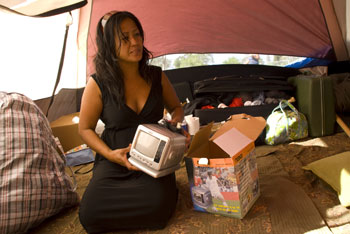
The dark-haired woman in the black cotton dress is an estate agent who sells mobile homes for a living. But since January 2008 she’s been living in a purple plastic tent under an elm tree. “My market just crumbled away,” she says. “The banks stopped lending money to my customers.” She opens the zip on the tent, reaches for her cell phone, steps outside and hangs a pair of wet trousers on the line. Caluag used to sell six houses a month, until the US credit crisis abruptly switched off the financial tap. First her clients lost their home. Then the estate agent found herself unable to pay her bills, her mobile home went under the hammer, and she was homeless.
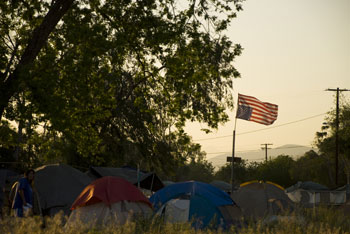
Caluag dials a number. After a short conversation, she dials the next one, then another. “Finding work is impossible,” she says, biting into a sandwich. “As soon as someone hears I don’t have any fixed address, they hang up.”
She is also in a bad mood because her boyfriend has just told her he will never visit her at this place. “I feel as if I’ve had my head cut off, and…” She stops, unable to hear her own words. The roaring of a Boeing 757 preparing for take-off drowns everything out. Camp Hope, the name of this tent city, is located right at the end of the runway at Ontario Airport. Every ten minutes a low-flying jet zooms over the dusty, shapeless campsite.
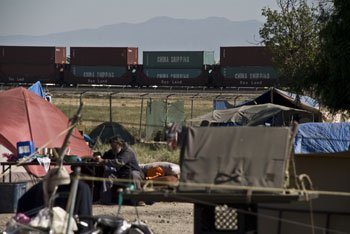
Not far from her tent are the train tracks that run inland from the cargo port in Long Beach. Every half hour, a freight train thunders past. Many wagons are green containers bearing the words “China Shipping”.
Cheap Chinese imports have dominated the US market for a long time, creating a giant trade deficit that has driven America’s debt up and the value of its dollar down. “From our tent, we watch the mountain of debt growing on the tracks,” says Ronda Farnsworth, a corpulent 30-something law student. Thirty years ago, her mother purchased a house not far from Ontario. Last year she took out a loan on it with New Century, a lender of sub-prime mortgages: the riskiest of loans. Shortly afterwards New Century went bankrupt, and the house was sold at auction for 8,000 dollars. As Farnsworth owed money, she didn’t receive a cent from the sale. But now she is seeking legal redress. “We were robbed,” she says, bluntly.
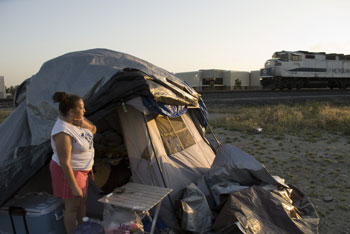
The new camp—everyone talks about the new camp. The Ontario authorities recently decided to try to reduce the chaos, so a wire fence now runs through the middle of the camp, enclosing a gravel square the size of a football field. In this fenced-off area are rows of empty white tents with green sunroofs. The ground is covered with strong- smelling wood-chips. Seven council workers in fluorescent jackets are working here. They speak Spanish and a radio is blurting out ranchero music. It’s a bizarre scene: Mexicans building polyester shelters for homeless Americans.
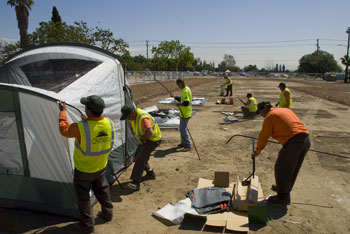
Outside the fence, other labourers are screwing iron brackets onto benches, so that people can sit on them, but not lie down. The next morning they deliver mobile toilets, set up showers, and install security cameras that will watch the campsite non- stop. Once the council-owned camp with its 149 tents is up and running, only those people in possession an ID card issued in Ontario will be admitted. The camp gates close between ten at night and six in the morning, and throughout that time everyone must stay inside. Two private security guards spend all day and night driving up and down the perimeter fence in a Toyota Corolla. If they see anything suspicious, they call the police. “We don’t get involved ourselves,” explains a chubby guard in a starched shirt.
At the east end of the camp, David James puts a piece of wood on a small fire. This skinny 50-something man has a crew cut and wears jeans, and an open jacket revealing his bare chest. He places a grill over the glowing charcoal and puts a sooty kettle on it. Then he feeds a friend’s dog. He grabs a cup from a cardboard box, rinses it out, tips two spoonfuls of Nescafé in and adds a sugar cube. When the water starts boiling, it’s coffee time. He slurps the hot liquid. “Not bad,” says James. “When I came here, I couldn’t even light a fire.”
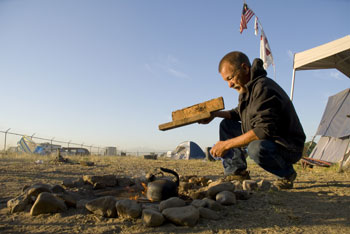
He is divorced; his two grown-up children have no idea their father is homeless and living in a tent. He lights a cigarette on the campfire and pulls his trouser leg up to the knee. “Look, that’s why I’m here.” There’s a 20cm scar running up his calf from the ankle. He throws more wood on the fire. “But my leg is mended and now I’m looking for work.”
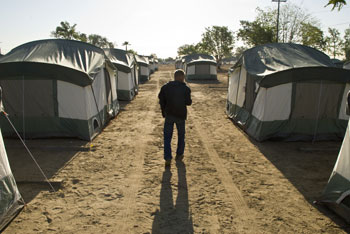
A minute later he’s in the new council camp. The west gate is open. James creeps in and inspects his new home. He’s holding a cup of fresh coffee. He walks along a row of tents, bends down, unzips one of the tents and steps inside. “Oh, I like it. There’s plenty of space in here,” he says. His eye catches a semicircular flap where pets can come and go. This is not something you’ll find in the camp where James is living now. Cats and dogs are forbidden. But almost everyone has a pet of some kind. “It’ll be a drama,” James fears. “No one knows what’s going to happen to these animals.”
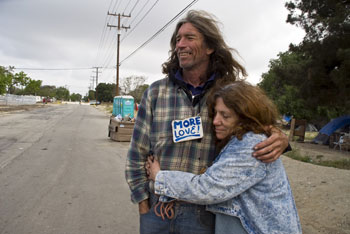
According to Busch, it all began in the 1980s with Ronald Reagan. First as Governor of California and then as President he was responsible for cuts in social welfare. After that, he says, “we became dependent on continually rising real estate prices. The mere belief that houses would rise and rise in value was enough to drive the economy.” But now the country has woken up with a hangover. “We are real estate alcoholics.”
Estate agent Caluag’s neighbour has his own way of depicting America’s housing crisis—he has hung his ‘Stars & Stripes’ upside down. He says the inverted flag symbolizes that the country is under stress and in need of help. “Camp Purgatory” is written on the mast. It’s hot and dusty, and there are more dirty tents than clean ones. Many of the campers are drug dependent, and the nights are often violent. One attack left a slit in Caluag’s tent.
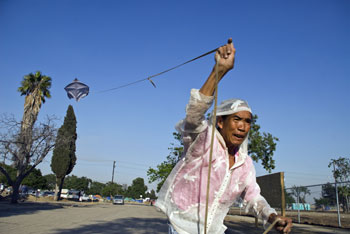
But one person doesn’t know what respect is. A homeless woman offers the chubby guard from Securitas a plate of spaghetti. “No thanks,” he says, waving the plate away and grinning through the car window. “I don’t want to spend all night on the toilet.” The woman walks away shaking her head. “What an idiot,” she says.
Next to David James’s home a hand-painted Red Cross flag flutters in the breeze. It’s a place of comfort on the camp. People come here if they need something: soap, a sleeping bag, a hug. A piercing scream breaks the silence. “Yolanda can’t walk,” says James and calls Clifford Spencer, a bullish man in denim shorts with tattoos on his arms, who grabs a small case with a red cross on it. “We have to go to her tent right away,” he says.
In the night Yolanda Truglia’s foot has become inflamed. She has three children and lost her house after her divorce. Before Christmas she met David McIlmoil, 12 years her junior, a camp resident and a veteran of the first Gulf War. He has been in and out of prison since he left the army. He is shirtless and his bare chest and shoulders are adorned with tattoos of monsters. He kisses Yolanda. “It was love at first sight,” he says. “Since then, I’ve been living in her tent. She pushes him away, tormented by “hellish pains”, as she describes them.
Truglia suffers from diabetes. Yesterday she ran out of insulin. Spencer enters the green tent, takes out a pair of scissors, disinfects them and cuts two ulcers open. Puss and blood squirt out. James, who is sitting next to her, gives her his hand but she rejects it. “You can tolerate more pain than I can,” he says. “No wonder, I’m a woman,” she says. Spencer washes the wound and dresses it. Then he rubs her feet with ointment. She hugs him in gratitude. “You desperately need insulin,” he says and drives her to the nearest clinic.
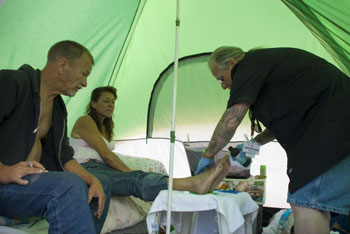
In the evening, the sun casts a magical light on the mountains of San Bernardino. Spencer learns that Yolanda would have died of blood stasis if he hadn’t treated her and taken her to the clinic. “It cost hardly anything at all to save her life, just a little time and a few dollars for the petrol,” says the helper. “I’m happy she’s alive. Nobody would have cared if she had died.”
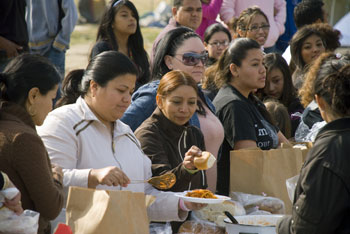
To one side of the line is David Busch, the activist with the beautiful eyes. He doesn’t eat anything. “I’d rather look for leftovers in the rubbish bins,” he says. There are fifty churches at Camp Hope trying to recruit new members. They hand out food three times a day. “The State has passed social responsibility onto the church,” says Busch, “and they exploit people’s misery to fish for new members.” Nevertheless, no one goes hungry here. A group of smartly dressed Mexicans arrive later, then wait in vain for people to feed. The homeless are already full.

To Whom It May Concern,
Please allow me to introduce ourselves.
Novetents Co., located in LongYan, China, is one of leading professional manufacturers in producing bivvy tents, mountaineering tents, outdoor tents etc.
I hope to develop business with you to make you as competitive as possible in the tents products market.
Should you have any question, pls do not hesitate to contact us.
Thanks for your attention.
Best regards,
Cindy
President
Novetents Co., Ltd.
http://www.novetents.com
Tel: 0086 05972983393
Email: Novetents@163.com